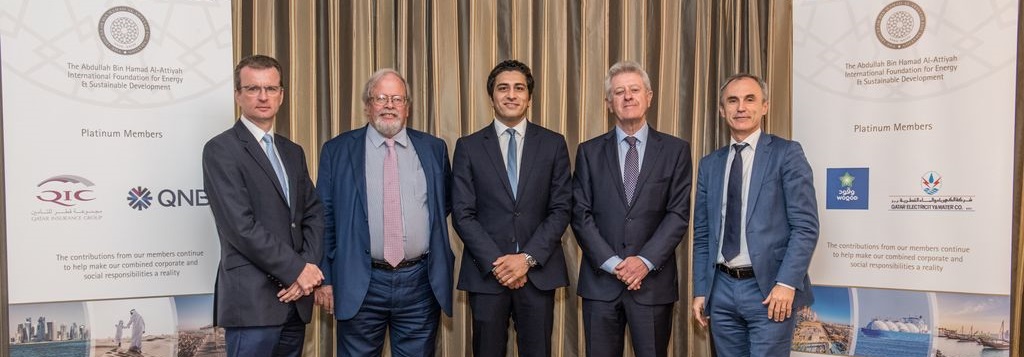The Al-Attiyah Foundation hosts global experts to explore: “Petrochemicals and the changing trends in refineries”
 The Al-Attiyah Foundation hosts global experts to explore: “Petrochemicals and the changing trends in refineries”
The Al-Attiyah Foundation hosts global experts to explore: “Petrochemicals and the changing trends in refineries”
July 2019
The Al-Attiyah Foundation hosts global experts to explore: “Petrochemicals and the changing trends in refineries”
We live in a time of economic uncertainty. Energy is buffeted by potential responses to climate change and the need to reduce CO2 emissions on the one hand, whilst responding to a growing world population and progressing towards achieving the United Nations Sustainable (SDGs) on the other. Within this context, the Al-Attiyah Foundation hosted its 2nd CEO Roundtable meeting of 2019, with world-renowned expert speakers: Dr Andrew Spiers, Senior Vice President, Nexant Energy and Chemicals Advisory International; Alan Gelder, VP Refining, Chemicals and Oil Markets, Wood Mackenzie; Professor Paul Stevens, Distinguished Fellow from Chatham House; and Eric Duchesne, Senior VP, Manufacturing and Projects, Total, to explore how the refining industry is evolving in response to these challenges.
Andrew Spiers, Senior Vice President, Nexant Energy believes that: “With limited availability of gas for new petrochemical investments in the region, it is turning its attention to petrochemical production from refineries. This is a trend that has successfully been used in Europe to significantly add value to refined products. It will the economies in the region to further diversify their industrial base. However, this adds significant complexity to the investment and substantially increases the cost base so these will be major investments.”
Historically, the basic economics of refining has been to refine at the place where demand exists – as crude oil and products are shipped by volume rather than weight – so it is always cheaper to ship crude rather than products. The advent of large crude carriers has emphasized this trend. Small refineries were often established in crude
supplying countries to provide a small domestic market and to ensure security of product supply. Gradually, crude suppliers have sought to capture some of these refining margins. In the meantime, domestic markets in crude oil supplier’s home markets have grown dramatically. Consequently, concerns over the security of supply of all refined products has required those domestic refineries to grow.
The general pattern of future demand is agreed by most oil company forecasters. Overall demand for oil products is seen to plateau out by 2040. Usage is not curtailed up to that date but switching has occurred from most uses into petrochemicals. Fuel efficiency in the vehicle fleet is considered to be a major factor in reducing demand for naphtha.
During the roundtable, Professor Paul Stevens of Chatham House, gave a word of caution about these forecasts: “there is a probability that forecasters are overly optimistic about underestimating the speed of change. Changes should occur due to energy efficiency across the whole range of energy uses.”
Alan Gelder, Wood Mackenzie added: “forecasting the future when technical change is fast, is not easy. When transport becomes electrified, then change may be dramatic.”
Another discernable trend discussed during the Roundtable meeting, is the integration of petrochemical production into the refining process. Here, the possibilities seem endless for a range of petrochemicals, particularly if cheap ethane extracted from natural gas is also available at the same site. Eric Duchesne from Total said during the Roundtable meeting: “we recognize that projects are getting larger and more integrated but there is another challenge: Talent. Engineers and other design staff are aging and the manufacturing industry struggles to attract the best talent.”
So how will these trends affect the industry? What strategic considerations are involved in making a business case for integration? What are the key challenges and opportunities associated with integration into larger composite plants? The answers can be found in the Whitepaper produced from the outcome of the discussions during the CEO Roundtable and distributed to Foundation members.
H.E. Abdullah Bin Hamad Al-Attiyah Founded the CEO Roundtable Series as a platform for knowledge exchange and support for the global community in the quest towards a sustainable energy future. All guests have the opportunity to share their opinions and understanding in what is always a thought-provoking and lively discussion.
In addition to the CEO Roundtable Series, the Al-Attiyah Foundation publishes energy and sustainable development research and insights through a variety of daily, weekly and monthly reports and papers. Further details of the Foundation’s activities can be found at www.abhafoundation.org or by following the Foundation on LinkedIn and Twitter.